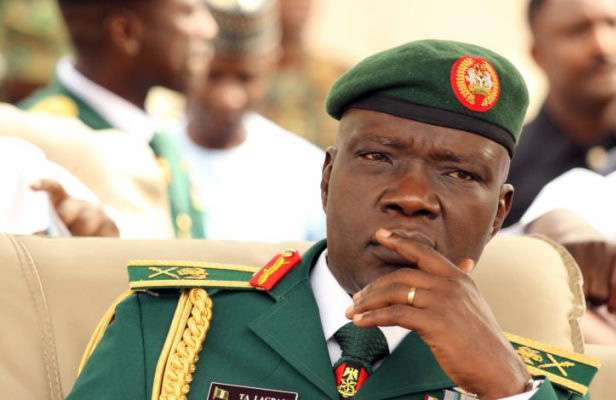The Nigerian government has officially announced with deep sorrow the passing of the Chief of Army Staff, Lieutenant General Taoreed Abiodun Lagbaja. The tragic news has sent shockwaves through the Nigerian Armed Forces and the entire nation, with government officials, military personnel, and citizens expressing profound grief over the loss of the distinguished military leader. General Lagbaja, who passed away unexpectedly, was at the forefront of Nigeria’s defense and security efforts and was widely regarded as a strategic thinker and a symbol of military professionalism.
Lieutenant General Lagbaja’s career in the Nigerian Army spanned several decades, during which he earned a reputation for discipline, leadership, and a deep commitment to his country. Born into a military family, Lagbaja followed in the footsteps of many in his lineage and pursued a career in the Armed Forces, quickly rising through the ranks due to his exceptional skills, loyalty, and dedication. He was appointed Chief of Army Staff in 2023, a position that placed him at the helm of the Nigerian Army during one of the most challenging periods in the nation’s history, marked by rising insecurity, insurgency, and military confrontations in various parts of the country.
Before his appointment as the Chief of Army Staff, General Lagbaja held numerous key command positions within the military, demonstrating his versatility and expertise across different areas of military operations. He commanded various divisions and formations, playing a critical role in operational successes against insurgent groups, especially Boko Haram and other terrorist organizations in the northeast region. His leadership was integral to the Nigerian military’s efforts in modernizing its equipment and enhancing its operational readiness to meet both domestic and regional security challenges.
General Lagbaja’s tenure as Chief of Army Staff began at a particularly difficult time for Nigeria, as the country faced a myriad of security challenges, including the resurgence of terrorism, ethnic violence, and organized crime across various regions. Despite these challenges, he worked relentlessly to improve the coordination between the military, law enforcement agencies, and the federal government. His leadership was marked by a strategic focus on tackling the root causes of insecurity, such as poverty, unemployment, and inadequate infrastructure in conflict-prone areas.
One of General Lagbaja’s hallmark achievements was his focus on the welfare and well-being of military personnel. Recognizing the sacrifices of soldiers who put their lives on the line in defense of the nation, he advocated for improved conditions of service, better training, and better equipment for the troops. His emphasis on training was seen in the modernization of the Army’s doctrine and the strengthening of its intelligence and counterterrorism capabilities. Under his leadership, the Nigerian Army made considerable strides in re-equipping its units, as well as in improving the morale and professionalism of the force.
The Nigerian government, in its official statement, expressed deep sadness over General Lagbaja’s passing. President Bola Ahmed Tinubu, in a heartfelt message of condolence, described the late military chief as an exceptional officer whose unwavering commitment to national security and defense was unparalleled. President Tinubu acknowledged General Lagbaja’s tireless efforts in strengthening Nigeria’s military might and ensuring the safety of its citizens. He conveyed his deepest sympathies to the family of the late general and to the Nigerian military, saying that his contributions to the country would be remembered with great respect and admiration.
Other government officials and military leaders have also paid tribute to the late Army Chief. The Minister of Defense, the National Security Adviser, and the Chief of Defense Staff all expressed their condolences and praised General Lagbaja’s role in stabilizing the country’s security landscape. Senior military officers, colleagues, and rank-and-file soldiers alike mourned the loss, describing him as a leader who led by example and whose leadership qualities inspired confidence in both his peers and the soldiers under his command.
Across Nigeria, the passing of Lieutenant General Lagbaja has prompted an outpouring of grief. Flags were flown at half-mast, and national mourning was declared in recognition of the general’s contribution to the country’s defense. Military installations around the country held solemn ceremonies in honor of his legacy, with fellow officers and soldiers paying their respects to one of the Nigerian Army’s most respected commanders.
The Nigerian public, particularly those in the northeast and other areas affected by insurgency, also expressed their sorrow. Many Nigerians had come to see General Lagbaja as a figure of hope in the fight against terrorism and insecurity. His leadership had provided a sense of stability at a time when the country was grappling with numerous security challenges. His death has left many wondering about the future direction of Nigeria’s security policies, particularly in the battle against insurgents and criminal elements that continue to threaten the peace of the nation.
In the wake of General Lagbaja’s passing, there is widespread anticipation regarding the appointment of a successor to the critical position of Chief of Army Staff. The Nigerian government is expected to announce a new Army Chief in the coming days, with military analysts and political observers speculating on potential candidates who could step into the role and continue the work started by Lagbaja. The new Army Chief will be tasked with continuing the mission of securing Nigeria’s borders, tackling insurgency, and addressing the numerous security challenges that persist across the country.
The death of Lieutenant General Taoreed Abiodun Lagbaja marks the end of a significant chapter in the Nigerian Army’s history. His legacy will undoubtedly live on through the reforms he implemented, the lives of the soldiers he mentored, and the many Nigerians who benefitted from his efforts to restore peace and security to the country. As the nation comes to terms with this tremendous loss, his contributions to Nigeria’s military and his role in securing the nation’s future will remain an enduring part of his legacy. The nation stands united in mourning the passing of a hero who dedicated his life to the service of his country and its people.





